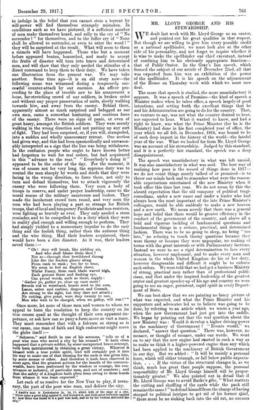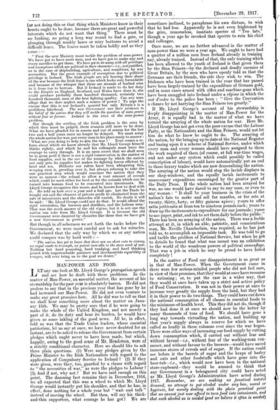MR. LLOYD GEORGE AND HIS STEWARDSHIP.
WE dealt last week with Mr. Lloyd George as an orator, and pointed out his great qualities in that respect. But though we are willing to give him every possible credit as a national spellbinder, we must look also at the other side of his personality, and not forget to inquire whether it is wise to make the spellbinder our chief executant, instead of confining him to his obviously appropriate function— that of Public Orator. In the Gray's Inn speech, which formed the subject of our article of December 22nd, all that was expected from him was an exhibition of the power of the spellbinder. It is his speech on the adjournment of the House on Thursday week with which we must now deal.
The more that speech is studied, the more unsatisfactory it appears. It was a speech of Promises—the kind of speech a Minister makes when he takes office, a speech largely of good intentions, and setting forth the excellent things that he and his Administration are going to do for the country. That, we venture to say, was not what the country desired to hear, nor expected to hear. What it wanted to know, and had a right to know, was what the Prime Minister (for he is the Ministry) had done in his first completed year of office, the year which we all felt, in December, 1916, was bound to be of such deep import in the history of the world—the fateful year of the war. What we looked for from Mr. Lloyd George was an account of his stewardship. Judged by this standard, and it is a perfectly fair standard, the speech was a deep disappointment.
The speech was unsatisfactory in what was left unsaid. It was also unsatisfactory in what was said. The best way of realizing how poor is the record of things done in 1917— we do not count things merely talked of or promised—is to throw our minds back and to remember what were the reason- able expectations entertained of the new Ministry when it took office this time last year. We do not mean by this the absurd expectation that the old company of political tragi- comedians, under a new name and under a leader who had always been the most important of the late Prime Minister's colleagues, would be able suddenly to make a new heaven and a new earth. We mean merely that there was a general hope and belief that there would be greater efficiency in the conduct of the government of the country, and above all a bold and vigorous tackling of fundamental questions and fundamental things in a serious, practical, and determined fashion. There was to be no going to sleep, no being "too late," no refusing to touch thorny questions because they were thorny or because they were unpopular, no melting of terms with the great interests or with Parliamentary factions. Instead we were to see a rigid determination to face every situation, however unpleasant, and to make every man and woman in the whole United Kingdom do his or her duty, however disagreeable and difficult it might be to enforce such orders. We were told that we had got a business Ministry of strong, practical men rather than of professional politi- cians, and that under the inspired leadership of the greatest orator and greatest speeder-up of his age and country we were going to see an eager, persistent, rapid spirit in every Depart- ment of State.
We can beat show that we are painting no fancy picture of what was expected, and what the Prime Minister and his supporters and advocates led us to believe was going to be done, by referring to an article which we wrote a year ago, when the new Government had just got into the saddle. We began by pointing out that the real question about the new Ministry was : Would it develop a higher driving-power in the machinery of Government ? "Events would," we declared, "answer that question." There was, however, no menace, or thought of menace, under our words. We went on to say that the new engine had started in such a way as to make us think it a higher-powered engine than any which had been applied to the machinery of British Government in our day. But we added : "It will be mainly a personal force, which will either triumph, or fall below publio expecta- tion. . . . If the virtue of the structural changes is, as we think, much leas great than people suppose, the personal responsibility of Mr. Lloyd George himself will be propor- tionately greater." We also pointed out in detail that if Mr. Lloyd George was to avoid Burke's gibe, "What matters the cutting and shuffling of the cards while the pack still remainsthe same ? "to defend himself from the charge of having stooped to political intrigue to get rid of his former ejlief, "there must be no sinking back into the old rut, no excuses
or not doing this or that thing which Ministers know in their hearts ought to be done, because there are great and powerful interests which do not want that thing. There must be no funking, no going a long way round to find a gate, or plunging through muddy lanes or miry bottoms to avoid a difficult fence. The fences must be taken boldly and as they come :— "First the new Ministry must tackle the problem of man-power. We have got to have more men, and we have got to make any and every sacrifice to get them. We have got to do atooy with all privileges and exemptions which are political in their diameter—i.e., not justified, as in the case of shipbuilding, agriculture, and munitions, by war necessities. But the great example of exemption due to political privilege is Ireland. The Irish people are not bearing thew share of the war because the Irish fence is one which looks very formidable and because ef the whisper that there are strands of barbed wire in it from top to bottom. But if Ireland is made to do her duty to the Empire as England, Scotland, and Wales have done it, she could produce probably three hundred thousand, certainly two hundred thousand, men of the best fighting quality. Can any man allege that we dare neglect such a source of power? To urge the excuse that this is not Ireland's quarrel but only Britain's is a perfidious falsehood. The new Government owe their existence to the belief of the nation that they will tackle the question of manpower without fear or favour. Ireland is the crux of the man-power problem. But though the settling of the Irish problem is the crux by which they must be judged, there remaiwi still more to be done. What am have pleaded for in season and out of season for the last two and a half years must no longer be delayed. We must array the whole nation for war, put every mania his place ready to answer : ' What are you doing to help to 'win the war ? ' Next comes a re- form about which we know already that Mr. Lloyd George hinwelf thinks rightly, and which he and his colleagues must have the courage to carry through. It is an open secret that we shall soon be in great peril if them is not a rigid conservation in the matter of food supplies, and in the use of the tonnage by which the nation not only gets its supplies but makes its fighting forces efficient by land and sea. Hitherto our rulers have been whispering this, wmping over it, growling over it, but always refusing to take the one practical stop which would convince the nation that they were in earnest—the refusal to allow a vast amount of cereals which could be used either for food or for the animals which can be turned into human food to be converted into intoxicants. Mr. Lloyd George recognises this waste, and he knows how to deal with it. He told us how over a year and a half ago. Let the Trade be bought out and the element of private profit be eliminated from the sale of intoxicants and the obstacles will vanish. No doubt it will be said: 'Mr. Lloyd George could not do that. It would offend the rigid teetotalers, the brewers and distillers, and the Labour men.' That was the stock answer of the old riginie, but it is net one the nation can take from Mr. Lloyd George. It is because the old Government were daunted by obstacles like these that we have got a new Government in power."
But though in all soberness we set forth the tasks before the Government, we were most careful not to ask for miracles. We declared that the only way by which we or any nation could conquer was by hard work :— " The nation has got to learn that there are no short cute to victory, no royal roads to triumph, no patent cure-ails in the stern work of war. Nothing but hard pounding, hard trudging, arid hard thinking joined with imperturbable patience and inexhaustible equability of temper, will ever bring us to the goal we desire."



























 Previous page
Previous page